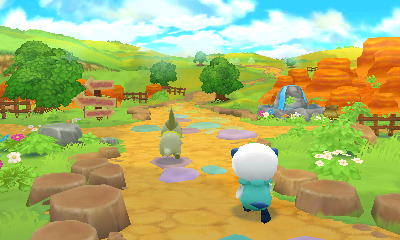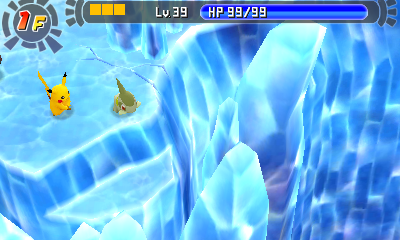 |
Title | Pokemon Mystery Dungeon: Gates to Infinity |
|---|---|---|
| Publisher | Nintendo | |
| Developer | Chunsoft | |
| Release Date | March 24, 2013 (NA), May 17, 2013 (PAL) | |
| Genre | Dungeon-Crawler | |
| Platforms | Nintendo 3DS | |
| Age Rating | ESRB: E, PEGI: 7 | |
| Official Website | ||
The Pokemon Mystery Dungeon spin-off franchise has humble enough beginnings, I suppose. Red Rescue Team and Blue Rescue Team were released countless years ago; one was on the Gameboy Advance, and the other was a flagship title for the Nintendo DS. The two didn’t share many differences across platforms besides what Pokemon could be recruited, and other minor nuances. The same can be said for the DS games that followed them up: Explorers of Time and Explorers of Darkness, respectively. The second generation of Pokemon Mystery Dungeon games was met with so much success that a third game was made to compliment those, Explorers of Sky.
Told you that to tell you this, folks: I’ve played every last one of those games to completion. So if you’re expecting me to follow the norm when it comes to reviewing a Pokemon Mystery Dungeon game, to begin griping about repetitive gameplay and everything feeling the same, etc, etc—you won’t find that here. Gates to Infinity does quite a bit to enhance various aspects of the same well-treaded formula, but I knew what to expect from this game going into it, and I feel like most people reading this should know what to expect, too. For the few who don’t, allow me this:
You control a group of one to four Pokemon, you explore randomly-generated dungeons for loot, for potential recruits (read: other Pokemon to join you—catch ‘em all—what have you), and for the story when you reach the end. Whether you’re playing the Gameboy Advance outing, the many games to come after, or the newest game in the franchise… what I’ve just said describes the formula consistent for every last one of these games. If you’re even remotely intrigued, I suggest you read on—because there’s more to a Pokemon Mystery Dungeon game than meets the eye.
At a Glance: Why is such a treaded path worth experiencing?
Believe it or not, the rich story told in the Pokemon Mystery Dungeon games is what keeps me coming back. No, I’m not messing with you. Although you play as Pikachu and other familiar Pokemon characters, although the overall tone in this game is one definitely aimed at children—the Pokemon Mystery Dungeon games house some of the deepest, darkest, most philosophically enriched tales found in first-party Nintendo titles. You may go into it expecting something childish, but a lot of the tropes, twists and turns these stories take are truly dark and deceptive at a glance, reminiscent of early Final Fantasy games more-so than what you’d expect from a game with Pikachu on the box.
 |
 |
Those familiar with these games, but on the fence about Gates to Infinity probably already know this. And I’m happy to say that Gates to Infinity delivers in terms of the story it tells. Initially, I was put off, because the goals of the main character(s), as well as everyone’s tendency to insist “YEAAAAAHHH!!” over and over again…definitely speak to the game’s intended audience. But alas, by the end, and by the time I knew enough about the plot to think about putting Spoiler tags everywhere, this game’s story has truly redeemed itself. Don’t get me wrong—this plot is somewhat thin and absolutely pales in comparison to the story that Explorers of Time/Darkness/Sky tells—but, those returning to the franchise for its story won’t be disappointed by the time the credits roll. And that’s definitely to the game’s credit.
 |
 |
Know what else is to the game’s credit? Its presentation is top notch, far and away the most impressive thing about this game. The artistry and graphics of the previous games have been ditched in favor of fully-3D models (you know, the ones used in Pokedex 3D Pro…) that populate absolutely gorgeous environments bursting with happy, with hopeless, with whatever’s deemed necessary. They’re really quite impressive. The linear dungeon-designs of previous outings are sometimes ditched in favor of huge, lush environments with features you can interact with (such as knocking a tree down to make a bridge). What the treaded path becomes capable of in a fully-rendered world is worth taking note of, for sure. Also, the game’s soundtrack boasts a similar quality. Catchy tunes make good company throughout your adventure across multiple floors. The music is appropriately paced, again properly accenting “happy and hopeless” as needed.
If you want to grab Pokemon Mystery Dungeon: Gates to Infinity for your kid, or your younger brother or sister to enjoy, I would give this game a perfect score. The presentation, the story, and the gameplay are all wonderful if viewed at a surface level. But, many of you reading this aren’t concerned with the surface. You want me to dig deeper.
And if you dig deeper into this game, especially when comparing it to its predecessors… you start to realize that the game has buried flaws, not treasure.
Gates to Infinity Giveth & Taketh Away
 |
 |
 |
In each of the Mystery Dungeon games, you play as a human that gets turned into a Pokemon for whatever reason. In the GBA and DS outings, the player is offered a fun personality test that determines what Pokemon (from a list of popular starters) he or she most resembles on the inside. After that, you’re able to pick a partner Pokemon. And the two of you depart on an adventure featuring a huge, diverse population of Pokemon from each major generation of games. In the case of Explorers of Sky, I believe 492/493 Pokemon were recruitable, and obtaining them all could make for countless hours added onto the fun.
Gates to Infinity…features all of the fifth generation Pokemon (so the Black & White games), and very few returning Pokemon from previous generations. Yes, there’s Pikachu, and the Eevelutions, and the occasional Quagsire, but you should go into Gates to Infinity expecting to see only Pokemon from Black & White. If you don’t like the fifth generation for any number of reasons, I suggest turning away from this game immediately, because although the quality of this game is top notch, the quantity of Pokemon is extremely limited in comparison to the games that came before it. The game offers such pretty places to explore, but each of these places primarily consists of the same Pokemon. No variety. Definitely takes away some of the fun factor, and made the first handful of missions before the story really started to pick up absolutely slow to a crawl.
Why so slow? The previous games featured lots of down-time between major plot arcs. Seasoned explorers would pick up a handful of missions that all involve the same dungeon and venture forth for lots of challenge, and lots of treasure. This cannot happen in Gates to Infinity. There is still a lot of down-time, but the job system of the previous games that allowed the player to select multiple jobs that took place in the same dungeon has been ditched in favor of a system that only allows the player to select one job at a time. This change is definitely a detriment no matter how you look at it, and it makes…no sense at all.
 |
 |
 |
 |
I can’t negative on this game for too long, though. Gates to Infinity does numerous things to alleviate the player from the more cumbersome aspects of the dungeon-crawling formula. For example: rescuing can be done via Streetpass now. Neat. Also, experience is shared. So if you’re suddenly forced to use a Pokemon that’s been sitting there since the beginning of the game at Lv6 while the rest of your team is at Lv35, that Lv6 Pokemon will instantly grow to Lv35 the moment you take a step—because experience is accumulated for every single Pokemon that joins you, not just for whatever Pokemon are with you at the time. Awesome. Anything that makes for a less grindy game is definitely cool with me.
Team Skills can be acquired in treasure chests sometimes. These skills do things like…make allies who are confused unable to hurt their teammates, or force certain traps not to work, or restore some PP with every floor you travel. Selectable and customizable, these are a welcome addition to the franchise as a whole, once again with the aim to alleviate some of the game’s more cumbersome or aggravating aspects. Further to this effect are Team Attacks—devastating blows dealt to all enemies by a team that gets along or is otherwise “in sync” with one another.
Lastly—and this is a huge part of the game here—there is Paradise. This is your home, an area that is ultimately customizable, upgradable, and the part of the game you’ll probably spend the most time with. There’s so much to do, that it would take far too long for me to even try to elaborate. Whether you want to hone various skills, get lots of items, farm berries, focus on getting certain types of Pokemon to befriend you more easily—it’s all possible with Paradise, and you decide what your home consists of. Happy times indeed. And that’s ultimately a good note to end this review on, as I’ve barely scratched the surface on what Gates to Infinity does to enhance the “tried and true”.
The Verdict
So, Pokemon Mystery Dungeon: Gates to Infinity does countless things to add or enhance the games that came before it. Heck, I didn’t even get into the multiplayer or DLC offered! Everything under the hood of this game exists to make the experience many are familiar with more enjoyable. And everything about the experience itself is wrapped into a pretty neat package on the outside, too.
But… I just wish there was more. Gates to Infinity desperately needs more. More story than what we got, more Pokemon than just the fifth generation and a few others, more reason to keep coming back to experience what is clearly an attempt at an improved game and atmosphere. But in terms of content, this game offers very little for the tried and true dungeon explorer. I can’t, with a good conscience, recommend this game to the ones that will eye it on the shelf and expect something as rich and rewarding as Explorers of Sky. By the end of this review, ladies and gentlemen, I’m more inclined to recommend Explorers of Sky to any newcomer versus experiencing this new 3DS game.
There’s just not enough content here. For a game that boasts the word “Infinity” in the title, the experience this game offers, while fun in its own right, is very short-lived.
| Review Score | |
|---|---|
| Overall | |
Review copy was purchased by the reviewer.






